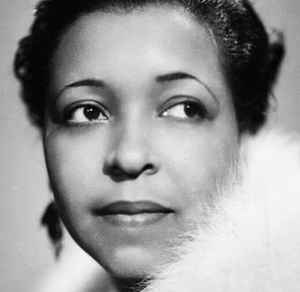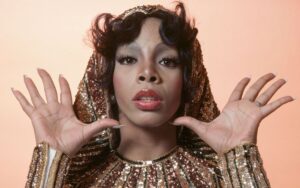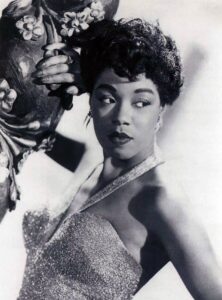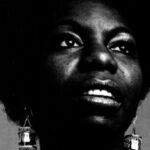In honor of Black History Month, WMPG reviewed the lives and contributions of Black icons to American pop culture by supplementing our usual programming with special shows, featured guest artists and additional on-air content throughout February. Now, as Black History Month comes to a close and Women’s History Month approaches, we invite our readers and listeners to look back on the excellence and influence of black women in the music industry.
Ma Rainey(1886-1939): Born Gertrude Pridgett in the Reconstruction-era Deep South, Rainey became the first female Black musician ever recorded in 1920, and was later dubbed the “Mother of the Blues”. She pioneered the genre, and still stands apart from almost all her contemporaries as a singer, songwriter, and stage performer. She was also openly queer and publicly in favor of racial equality decades before the Civil Rights and Gay Liberation Movements.
Bessie Smith(1894-1937): Known as the “Empress of the Blues”, Smith was the most famous and most widely acclaimed blues singer of the 1920’s and 1930’s. She began performing as a busker on the streets of Chattanooga, Tennessee when she was still a child, and got her professional start as a dancer in the Moses Stokes Company musical troupe, which Ma Rainey was the lead singer of at the time. Smith’s success eclipsed Rainey’s after she signed a contract with Columbia Records in 1923 and began receiving wide acclaim as a singer. Her success was relatively steady for almost 15 years until she was killed in a car accident.
Ethel Waters(1896-1977): After being persuaded to perform at a Philadelphia costume party in 1913, Waters was offered professional work as a singer in Baltimore and began her career in black vaudeville. She later worked at the same Atlanta nightclub as Bessie Smith, who refused to compete against Waters as a blues vocalist. Waters later moved to Harlem and found great success as a recording artist at Black Swan Records, the first major music label ever owned by, operated by, and targeted towards African Americans. She acted in films and performed on Broadway– being the first Black woman to integrate the Broadway theater district– in addition to maintaining a successful musical career. Waters became the first Black female television star and Emmy Award nominee, and the second African American Oscar nominee.
She later worked at the same Atlanta nightclub as Bessie Smith, who refused to compete against Waters as a blues vocalist. Waters later moved to Harlem and found great success as a recording artist at Black Swan Records, the first major music label ever owned by, operated by, and targeted towards African Americans. She acted in films and performed on Broadway– being the first Black woman to integrate the Broadway theater district– in addition to maintaining a successful musical career. Waters became the first Black female television star and Emmy Award nominee, and the second African American Oscar nominee.
Billie Holiday(1915-1959): Born Eleanora Fagan and later nicknamed “Lady Day”, Holiday cited early recordings of Louis Armstrong and Bessie Smith, which she first encountered while working as an errand runner for a brothel, as her childhood awakening to the possibilities of jazz music. Holiday made her professional start singing in Harlem nightclubs, and her recording debut came at age 18 with “Your Mother’s Son-In-Law” and “Riffin’ the Scotch”, two songs made in collaboration with Benny Goodman. Holiday went on to become a trailblazing jazz and pop vocalist, who took her stylistic and improvisational cues from jazz instrumentalists like Armstrong, Goodman, Bix Beiderbecke, and Fletcher Henderson. She also made political waves with her emotional performances of the song “Strange Fruit”, which described the aftermath of lynchings in gruesome detail. Holiday died at age 44 and posthumously won four Grammys.
Ella Fitzgerald(1917-1996): Raised in a blended family in New York City, Ella Fitzgerald’s introduction to performance was Earl “Snakehips” Tucker, a Black dancer who found great success during the Harlem Renaissance. He and early jazz singers like Connee Boswell were Fitzgerald’s most notable influences. After winning the chance to perform with Tiny Bradshaw’s band at the Harlem Opera House, Fitzgerald was introduced to Chick Webb and began a long career collaborating with his band and those of other jazz greats. She later earned the titles “First Lady of Song”, “Queen of Jazz”, and “Lady Ella”. Before her death in 1996, Fitzgerald won fourteen Grammys and was awarded the Presidential Medal of Freedom.
Sarah Vaughan(1924-1990): The daughter of two amateur musicians, Vaughan was raised Baptist in Newark Virginia, and her first experiences as a singer were in her church choir. She also grew up seeing jazz performances at her local skating rink, and began sneaking into nightclubs to hear more as a young teenager. She dropped out of high school and moved to New York in 1942 to focus on music, and soon won the Apollo Theatre’s Amateur Night contest, following in Ella Fitzgerald’s footsteps with this achievement and later returning to the Apollo to perform as Fitzgerald’s opening act that same year. Vaughan originally toured as both a vocalist and a pianist, but became primarily established as the former. She went on to win four Grammys, and was often publicly known by the nickname “Sassy”. Vaughan had no vocal training, and is still regarded as one of the greatest female singers of the 20th century.
Etta James(1938-2012).: James was raised by a series of foster parents in the Los Angeles area and received her earliest vocal training from James Earl Hines, the director of St. Paul’s Baptist Church’s Echoes of Eden choir, when she was just five years old. His teaching methods were quite abusive, and greatly affected the timbre of her voice and her behavior as a singer. James’ voice and style made her a pioneer in bridging the gap between R&B and rock n’ roll in the 1950s and 60s. Although her lack of sustaining hits on the charts left many of her albums underappreciated, public opinion of her contributions to the American jazz canon and the development of pop music slowly began to resurge during the 1990s. She won six Grammys, and was inducted into the Rock n’ Roll, Blues, and Grammy Halls of Fame.
Nina Simone(1933-2003): Simone was born Eunice Kathleen Weymon, the sixth of eight children in a poor North Carolina family. She began playing piano in a religious context as a toddler, and studied at the Juilliard School of Music after graduating high school. She began her career as a jazz performer while working as a nightclub pianist to pay for private lessons, and adopted the stage name “Nina Simone” during this time to conceal her choice to play non-religious music from her family. Simone went on to become one of the most celebrated jazz crossover artists of all time, infusing the more popular genres she became known for with influences of her classical training. She was also a vocal civil rights activist for most of her life, first using her platform to address racial inequality in the United States with the release of her song “Mississippi Goddam”.
Dionne Warwick(1940-): Warwick was born into the Drinkard Singers, a family gospel group based out of New Jersey that was managed by her mother. She was discovered by Hal David and Burt Bacharach while singing backup in a recording session, and although she originally signed on to work for them as a demo singer, the three struck up a musical collaboration not long after. This partnership made Bacharach and David household names, and shot Warwick to stardom. She went on to win five Grammys and become one of the highest-charting recording artists of all time.
Ronnie Spector(1943-2022): The original “bad girl of rock and roll”, Spector was born Veronica Bennett, and formed the girl group “The Ronettes” with her sister Estelle and their cousin Nedra Talley while they were all still in high school. The most successful era of their career, marked by the release of their single “Be My Baby” and their touring stint as an opening act for the Beatles, was fostered by producer Phil Spector. The Ronettes disbanded in 1967, and Ronnie Bennett became Mrs. Ronnie Spector in the following year. Phil Spector proved to be controlling and abusive as both a manager and a husband, and Ronnie reformed the Ronettes soon after leaving him in 1972. After unsuccessful attempts to break back into the business in the 70s, her early work resurged in popularity in the late 80s, and she and the Ronettes won a decade-long court case against Phil Spector for millions of dollars’ worth of unpaid royalties. The Ronettes were inducted into the Rock and Roll Hall of Fame, and Ronnie began releasing new music for the first time in years. She continued doing so until her death last month.
Diana Ross(1944-): Ross grew up in the North End of Detroit, the neighbor of future Motown Records vice president Smokey Robinson. It was Robinson who got Ross and The Supremes– or “The Primettes”, as they were then called– their first meeting with the Motown executives. The trio became their label’s top-selling act of the 1960s and one of the most popular girl groups of all time. Ross left The Supremes in 1970 and became the most successful female solo artist in music history. She has a Grammy, a Tony, and was awarded the Presidential Medal of Freedom in 2016.
Aretha Franklin(1942-2018): Born to a celebrity preacher father and pianist/vocalist mother, Franklin was raised as a gospel singer. She began soloing at her father’s church at age 10, and began touring under his management two years later. After almost a decade of touring as a religious artist, she moved to New York to pursue a career in pop music and signed with Columbia Records. After her album sales and charting stats disappointed the label executives, she moved to Atlantic Records and released her first major hit– a cover of Otis Redding’s “Respect”. It exploded in popularity as a feminist and civil rights anthem, and it also became her signature song; Redding laughed and said “That little girl done took my song away from me!” when he first heard her version. Franklin was dubbed the “Queen of Soul”, and went on to release many more acclaimed albums. She won 18 Grammys, a Pulitzer Prize, became the first female artist ever inducted into the Rock and Roll Hall of Fame, and was awarded the Presidential Medal of Freedom.
Donna Summer(1948-2012): Summer was born and raised in Boston, and performed in musicals throughout her high school years. Shortly before graduating, Summer left for New York and joined a blues rock band called “Crow”. The gr oup was turned down by a label because the only member they were interested in was Summer, and the band agreed to dissolve. Summer then auditioned for the counterculture musical “Hair”, and performed in the Munich production. While in Germany, she found some success as a musical theatre actress, and it was during her time there that she met Giorgio Mordoder and Pete Bellotte, two music producers who helped her break out as an international disco star. She became one of the best-selling artists of all time, and was nicknamed the “Queen of Disco”. She also won five Grammys, and was posthumously inducted into the Rock and Roll Hall of Fame.
oup was turned down by a label because the only member they were interested in was Summer, and the band agreed to dissolve. Summer then auditioned for the counterculture musical “Hair”, and performed in the Munich production. While in Germany, she found some success as a musical theatre actress, and it was during her time there that she met Giorgio Mordoder and Pete Bellotte, two music producers who helped her break out as an international disco star. She became one of the best-selling artists of all time, and was nicknamed the “Queen of Disco”. She also won five Grammys, and was posthumously inducted into the Rock and Roll Hall of Fame.
Author: Caroline Davis, USM student







